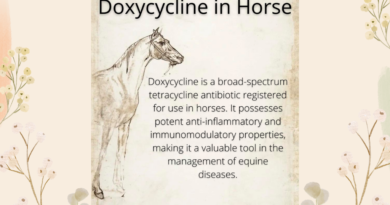How Often to Worm a Horse
Understanding Equine Parasites and the Need for Deworming
Equine parasites are a common concern for horse owners, and understanding their impact is crucial. These parasites can cause a range of health issues in horses, from mild discomfort to severe illness. It is important to recognize that horses are highly susceptible to worm infestations, as they often graze in pastures where parasites are prevalent. Furthermore, horses may also contract worms through contact with contaminated bedding or other animals.
Deworming plays a significant role in maintaining the health and well-being of horses. By administering appropriate medications, horse owners can effectively control and reduce the worm burden in their animals. Regular deworming helps prevent the negative consequences associated with parasitic infections, such as poor hair coat, weight loss, colic, and poor performance. Moreover, by actively managing and treating worm infestations, horse owners contribute to the overall welfare and longevity of their horses.
Identifying Common Types of Worms in Horses
Worm infestations are a common problem in horses, and it’s important for horse owners to be able to identify the different types of worms that can affect their animals. One common type of worm is the large strongyles, also known as bloodworms. These worms can cause severe damage to the blood vessels of the intestines and can lead to colic, weight loss, and anemia in affected horses. Another common type of worm is the small strongyles, which can burrow into the intestinal wall and cause inflammation and diarrhea.
Roundworms are another type of worm that can infect horses. These worms are commonly found in young horses and can cause problems such as poor growth and a dull coat. Tapeworms are yet another type of worm that can infest horses. These flat, segmented worms can attach themselves to the walls of the intestines and can lead to colic, weight loss, and poor condition. By being aware of the common types of worms that can affect horses, horse owners can take steps to prevent infestations and ensure the health and well-being of their animals.
Factors Affecting the Frequency of Deworming
Factors affecting the frequency of deworming in horses can vary depending on several factors such as age, lifestyle, and geographical location. Younger horses, particularly those under the age of 2, are more susceptible to worm infestations and therefore may require more frequent deworming. This is because their immune systems are not fully developed, making them more susceptible to parasites. Additionally, horses that are kept in crowded or unsanitary conditions are at a higher risk of contracting worms and may also require more frequent deworming.
The geographical location of a horse’s environment can also influence the frequency of deworming. Certain regions may have a higher parasite load or a longer parasite transmission season, requiring more frequent deworming. It is important for horse owners to consult with their veterinarian to determine the appropriate frequency of deworming based on their horse’s individual needs. By considering these factors, horse owners can ensure that their equine companions are protected against parasites and maintain optimal health.
Guidelines for Deworming Based on Age and Lifestyle
Guidelines for deworming horses vary depending on their age and lifestyle. For young foals, it is essential to begin a deworming program early to prevent the risk of infestations and to promote healthy growth. Foals should typically be dewormed every two to three months starting at around two months of age until they reach one year old. After the first year, the frequency of deworming can be reduced to every three to six months, depending on the horse’s individual needs and exposure to parasites.
Adult horses, on the other hand, generally require deworming every three to four months, but this can be adjusted based on their specific circumstances. Factors such as the horse’s living conditions, pasture management, and any known parasite challenges in the area should be considered when determining the frequency of deworming. Horses that are regularly traveling, competing, or living in high-risk areas may require more frequent deworming to maintain optimal health. It is always recommended to consult with a veterinarian to develop a tailored deworming schedule that suits your horse’s age and lifestyle.
Recognizing Signs of a Worm Infestation in Horses
One of the challenges of dealing with equine parasites is that they can be difficult to detect in the early stages. However, there are some common signs that may indicate a worm infestation in horses. One of the most noticeable signs is a change in the horse’s overall body condition. Infected horses may start losing weight, despite having a good appetite. Their coat may appear dull and rough, and they may have a generally unthrifty appearance.
Another sign to watch out for is changes in the horse’s behavior. Infected horses may appear lethargic or depressed, lacking their usual energy and enthusiasm. They may also exhibit signs of discomfort or pain, such as colic episodes or frequent tail rubbing. In some cases, horses with a severe worm infestation may have a visibly distended or bloated abdomen, indicating the presence of a heavy worm burden.
It is important to note that these signs may also be indicative of other health issues, so it is crucial to consult a veterinarian for proper diagnosis and treatment. Regular fecal egg counts and timely deworming protocols can help ensure the well-being and overall health of your equine companion.
Importance of Regular Fecal Egg Counts for Effective Deworming
Regular fecal egg counts are a crucial aspect of effective deworming in horses. These tests determine the presence and quantity of parasite eggs in the horse’s feces, providing valuable insight into the horse’s overall health and the effectiveness of the current deworming program. By monitoring the parasite load through fecal egg counts, horse owners can make informed decisions about when and how to administer dewormers, ensuring that the treatment is targeted and appropriate.
Fecal egg counts allow for a more personalized approach to deworming, as they take into account the individual horse’s parasite burden. This personalized approach helps prevent the development of drug resistance by minimizing unnecessary deworming and avoiding overuse of dewormers. By conducting regular fecal egg counts, horse owners can also identify horses with high parasite loads and take immediate action to mitigate the risk of parasite-related diseases. Ultimately, regular fecal egg counts play a crucial role in promoting the health and well-being of horses, aiding in the development of an effective and sustainable deworming program.
Implementing a Strategic Deworming Program for Optimal Results
Implementing a strategic deworming program is crucial to maintaining optimal health and reducing the risk of parasite-related issues in horses. By establishing a well-thought-out plan, horse owners can effectively manage and control the population of worms in their horses. One important aspect of a strategic deworming program is timing. It is essential to administer dewormers at the right intervals to target both mature and migrating worms. This helps break the life cycle of parasites and prevent them from causing harm to the horse. Additionally, rotating between different classes of dewormers is recommended to tackle specific types of worms and avoid the development of resistance. By carefully selecting and timing deworming treatments, horse owners can maximize the effectiveness of the program and minimize the potential negative impacts on both the horse and the environment.
Another key factor in implementing a strategic deworming program is assessing each horse’s individual parasite load. Conducting regular fecal egg counts allows owners to evaluate the level of infestation and determine the appropriate course of action. Fecal egg counts involve collecting a small sample of feces and examining it under a microscope to count the number of worm eggs present. This diagnostic tool helps determine if and when deworming is necessary for a particular horse. By tailoring the program to each horse’s specific needs, horse owners can avoid overuse of dewormers, reduce the risk of resistance, and optimize the health of their horses. Collaborating with a veterinarian is vital in designing a strategic deworming program that takes into account the horse’s age, lifestyle, and regional parasite risks.
Alternatives to Chemical Dewormers for Natural Horse Health
Many horse owners are looking for alternatives to chemical dewormers to promote natural horse health. Fortunately, there are several options available that can help control and prevent parasite infestations without relying solely on chemicals.
One popular alternative is the use of herbal supplements. Certain herbs, such as garlic and wormwood, are believed to have natural deworming properties. These supplements are typically added to the horse’s feed on a regular basis to help minimize the risk of worm infestation. While there is limited scientific evidence to support the efficacy of these herbal dewormers, some horse owners have reported positive results, leading to their increased popularity in natural horse health circles.
Another alternative method involves implementing pasture management practices. By rotating pastures and practicing manure removal, horse owners can help break the parasite life cycle and prevent reinfection. This approach requires careful planning and regular monitoring of the pasture conditions, but it can significantly reduce the reliance on chemical dewormers. Additionally, maintaining a clean and sanitary environment for the horses can help minimize the risk of parasite transmission and improve overall horse health.
Tips for Safely Administering Deworming Medication
Before administering deworming medication to your horse, it is important to consider a few tips to ensure their safety and well-being. Firstly, it is crucial to carefully read and follow the instructions provided by the manufacturer. Each dewormer may have slightly different dosage recommendations, so it is important to administer the correct amount based on your horse’s weight.
Secondly, it is recommended to consult with your veterinarian before starting any deworming regimen. They can provide valuable guidance and advice tailored to your horse’s specific needs. Additionally, they can help determine the appropriate frequency of deworming based on your horse’s age, lifestyle, and location.
When administering the medication, it is essential to use the proper equipment. A dosing syringe is commonly used to administer deworming paste, ensuring accurate measuring and administration of the medication. It is crucial to handle the syringe with clean hands to prevent the introduction of any contaminants. Gently place the syringe into the corner of your horse’s mouth, allowing them to swallow the medication at their own pace. Ensure that the horse has swallowed the entire dose before removing the syringe.
Lastly, it is important to properly dispose of any unused medication and packaging. Do not leave partially used dewormer tubes lying around, as they may pose a risk to other animals or small children. Follow the manufacturer’s instructions for proper disposal methods, which may include securily sealing the medication and discarding it in accordance with local regulations.
By following these simple tips, you can safely administer deworming medication to your horse and help maintain their health and well-being. Remember, always consult with your veterinarian for specific advice and guidance tailored to your horse’s needs.
Working with Your Veterinarian to Develop a Deworming Schedule
When it comes to developing a deworming schedule for your horse, it is crucial to work closely with your veterinarian. Their expertise and knowledge will play a vital role in ensuring the effectiveness and safety of the deworming program. As a horse owner, you can provide valuable information about your horse’s daily routine, diet, and any previous deworming treatments. This input, combined with your veterinarian’s professional assessment and understanding of equine parasites, will help develop a tailored deworming schedule that meets the specific needs of your horse.
During the consultation with your veterinarian, they will consider various factors to determine the frequency and timing of deworming treatments. These factors may include your horse’s age, lifestyle, and exposure to other horses. For example, young horses and those kept in large group settings may have a higher risk of contracting parasites and may require more frequent deworming. On the other hand, adult horses with limited exposure to other horses or a low parasite burden may not need deworming as frequently. By working together, you and your veterinarian can establish a deworming schedule that best suits your horse’s individual circumstances, ensuring optimal protection against parasites while minimizing unnecessary treatments.
What are equine parasites and why is deworming necessary?
Equine parasites are organisms, such as worms, that live in or on horses and can cause health issues. Deworming is necessary to eliminate these parasites and prevent their negative impact on the horse’s well-being.
What are the common types of worms found in horses?
The common types of worms found in horses include roundworms, tapeworms, strongyles, and pinworms.
How often should I deworm my horse?
The frequency of deworming depends on various factors such as age, lifestyle, and geographic location. It is best to consult with your veterinarian to develop a deworming schedule specific to your horse’s needs.
What guidelines should I follow for deworming based on age and lifestyle?
Guidelines for deworming based on age and lifestyle may vary, but generally, young horses and horses with high exposure to other horses or contaminated pastures require more frequent deworming than adult horses or those with limited exposure.
How can I recognize signs of a worm infestation in my horse?
Signs of a worm infestation in horses can include weight loss, poor coat condition, colic, diarrhea, or a potbelly appearance. If you notice any of these signs, it is important to consult with your veterinarian for proper diagnosis and treatment.
Why is regular fecal egg counting important for effective deworming?
Regular fecal egg counting helps determine the parasite load in your horse’s system. This information allows your veterinarian to tailor the deworming protocol specifically to your horse’s needs, thereby maximizing its effectiveness.
What is a strategic deworming program?
A strategic deworming program involves deworming horses at specific times, targeting parasites during vulnerable stages of their life cycles. This approach minimizes unnecessary deworming and helps prevent the development of parasite resistance.
Are there alternatives to chemical dewormers for natural horse health?
Yes, there are alternative approaches to deworming that focus on natural horse health. These may include herbal remedies, diatomaceous earth, or pasture management techniques. Consult with your veterinarian to determine the best options for your horse.
Any tips for safely administering deworming medication?
To safely administer deworming medication, follow the instructions provided by the manufacturer. Some general tips include using the appropriate dose for your horse’s weight, ensuring the medication is properly mixed and administered orally, and observing any precautions or warnings mentioned on the product label.
How can I work with my veterinarian to develop a deworming schedule?
To develop a deworming schedule, consult with your veterinarian who can assess your horse’s individual needs based on factors like age, health, lifestyle, and geographical location. Together, you can create a customized deworming plan that promotes your horse’s well-being.




